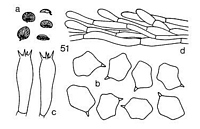|
 Claudopus byssisedus Claudopus byssisedus
SynonymsAgaricus byssisedus
BiostatusPresent in region - Indigenous. Non endemic
Images (click to enlarge)
Caption: Claudopus byssisedus (Fr.) Gillet
(Herb. Hk. 69/74): a. carpophores. b. spores. c. basidia. d. cuticle. |
Article: Horak, E. (1973). Fungi Agaricini Novazelandiae I-V. Beihefte zur Nova Hedwigia 43: 200 p.
Description: Pileus
3-10 mm diam., ear-shaped, flabelliform or conchiform, convex, whitish or greyish,
hygrophanous, dry, striate, radially fibrillose or silky. Lamellae excentrically
or laterally radiating, densely intermixed, pink when young turning beige-pink,
with concolorous gill edge. Stipe always developed, eccentric or laterally inserted,
cylindrical, curved, white, glabrous. Context greyish. Odor and taste strongly
farinaceous.
Spores
8-9 x 6-7.5 µm. 5-6-angled. Basidia 27-36 x 10-12 µm. 4 spored. Cheilocystidia
none. Cuticle a cutis of repent, cylindrical hyphae (6-14 µm diam.), membrane
thin-walled, not gelatinized. without conspicuous pigmentation. Clamp connections
lacking
Habitat: On rotten bark (Schefflera digitata)
and wood. New Zealand, Europe, North America.
Notes: It
seems that Claudopus depluens (Fr.) firstly mentioned for New Zealand
by Colenso (1893) is identical with Cl. byssisedus (Fr.) described above.
In spite of a thorough study no apparent differences were found between the
microscopical and macroscopical characters of Claudopus byssisedus (Fr.)
collected in Europe or North America (Hesler 1967: 16) and the material gathered
in New Zealand.
|